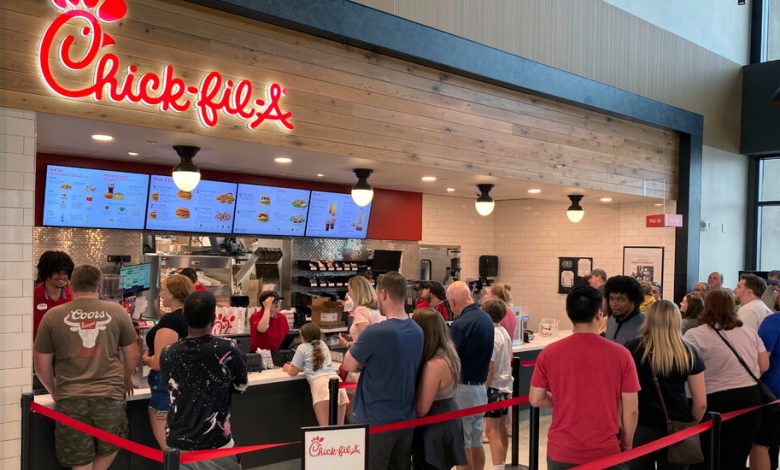Chick-fil-A’s Closed-on-Sunday Policy Prompts a Highway Rest Stop Revolt

Kelli Bogacz had just spent a week camping in the Adirondack Mountains, and as she and her husband negotiated the five-hour drive back home to Buffalo, all they wanted was something to eat.
Halfway through their journey, an oasis appeared: Chittenango Travel Plaza, a newly renovated rest stop on Interstate 90, just east of Syracuse. Yet as they pulled their pickup truck and 23-foot camper into the parking lot, they sensed a problem.
It was a Sunday afternoon last August. The only restaurant inside the rest stop was a Chick-fil-A. And, as anyone halfway familiar with the American fast food landscape knows, Chick-fil-A is closed on Sundays.
“So it was useless,” said Ms. Bogacz, 54, a sixth-grade teacher. “Utterly useless.”
The 27 rest stops that line the 570-mile-long New York Thruway are being systematically renovated now as part of a $450 million private investment plan. The project, which kicked off two years ago, has brought freshly gleaming facilities and a host of new businesses, like Shake Shack, Panda Express and, yes, Chick-fil-A.
But the developments have left some motorists, like Ms. Bogacz, frustrated and hungry — and now lawmakers in New York have taken up their cause, asking why many of the state’s rest stops now feature a restaurant that is famously closed on one of the busiest travel days of the week.
This month, lawmakers introduced a new bill that would require service area restaurants along the Thruway to open seven days a week. The proposal, like many things involving Chick-fil-A, has set off a minor political firestorm, with critics accusing the state’s Democratic legislators of attempting to force the chicken chain to upend its values.
The lawmakers say they are not targeting Chick-fil-A, which has frequently attracted controversy for the conservative Christian values of its chairman, Dan T. Cathy, who has spoken publicly against same-sex marriage. They just want to keep drivers fed.
“When they’re closed on one of the busiest travel days of the week, they’re not servicing the public like they should,” Emma Johnson, a spokeswoman for Assemblyman Tony Simone, who introduced the bill, said about the rest stop restaurants.
The issue dates back to 2021, when the New York State Thruway Authority invited bids for the right to operate its 27 service areas. The eventual winner was Applegreen, an Irish convenience store conglomerate, which pledged to fund a $450 million renovation plan and in return was awarded a 33-year contract to manage the sites.
The refurbished rest stops are reopening, one by one, to mixed reviews: While some facilities are garnering praise for their makeovers, others have been dogged by complaints about cramped corridors and insufficient bathrooms.
Applegreen, as part of the project, has thus far opened seven Chick-fil-A restaurants at rest stops along the Thruway, with three more to come soon.
Jennifer Givner, a spokeswoman for the Thruway Authority, said that the contract required Applegreen to offer at least one hot and cold food option 24 hours a day at all service plazas. She noted that the Chittenango Travel Plaza (where the Bogacz family was forced to skip lunch) was the only facility out of the 27 where Chick-fil-A was the sole restaurant option. (Chittenango also has a Starbucks coffee shop.)
She pointed out, too, that selecting specific restaurants was not the authority’s responsibility.
“Those restaurant contracts are with Applegreen,” she said. “They determine their own tenant plan.”
In a statement, an Applegreen spokesman said the company aimed to deliver “a range of food brand offerings to provide choice for customers.” Regarding the rest stops with Chick-fil-A restaurants, he added, “In each of those 10 locations, alternative hot and cold food options are always available seven days a week, 24 hours a day to ensure that our customers’ needs are fully met.”
The bill has angered those who believe the lawmakers are trying to force Chick-fil-A to open on Sundays, altering a policy the company has maintained since 1946, according to its website, which allows employees to rest and “worship if they choose.”
“This is war,” Senator Lindsey Graham of South Carolina wrote on X last week, in support of the chicken chain, as news of the bill began to circulate on social media. He threatened to introduce legislation withholding federal funds from any state or city that required Chick-fil-A to operate on Sundays.
On Wednesday, in New York, Senator Graham kept going, posing for pictures at a Chick-fil-A in Manhattan and criticizing the bill during an appearance on Fox News.
But the bill in fact would not force Chick-fil-A to open on Sundays.
As written, the bill applies only to “all future contracts for food concessions at transportation facilities owned by the Thruway Authority, as well as the Port Authority of New York and New Jersey.” Its sponsors confirmed on Wednesday that this meant the Thruway’s seven Chick-fil-A restaurants — and any additional locations opened by Applegreen under the current contract — could stay closed on Sundays, even if the bill passed.
The sponsors acknowledged that they were not fans of the chain or its social views. But they said they were more concerned in this case about protecting rest areas as a public good.
“We’re not talking about businesses on the corner of Main Street,” said State Senator Michelle Hinchey, who introduced a version of the bill in the Senate. “We’re talking about restaurants on the Thruway that are meant to be open to provide food and nourishment, fast food or otherwise, when we need it.”
Ms. Hinchey, who represents a rural district bisected by the Thruway, said her constituents were excited about the renovation project. But she had heard from some who were frustrated by long lines and the lack of dining options on Sundays.
Headquartered in Georgia, Chick-fil-A has more than 3,000 locations nationwide and is beloved by many. But it has attracted plenty of detractors, too. In recent years, separate proposals to open Chick-fil-A restaurants inside airports in Buffalo and San Antonio were scrapped following public pushback.
In 2021, when Applegreen was first awarded the contract, a different group of lawmakers in New York wrote letters to the Thruway Authority and the governor asking them to reconsider including Chick-fil-A in the highway’s rest stops in light of the chain’s past support of anti-L.G.B.T.Q. causes. They did not mention the chain’s unusual business hours.
The company was heavily criticized in the past for donations to groups that sought to stop the legalization of same-sex marriage. But under pressure, the company stopped such donations, and more recently has come under fire from conservatives for its diversity, equity and inclusion efforts.
Chick-fil-A did not respond to requests for comment, but the restaurant chain in the past has denied having any political or social agenda.
The company, for its part, has consistently adhered to its values. The chain, for example, operates a location inside Mercedes-Benz Stadium, the home of the Atlanta Falcons, that was closed for all eight of the football team’s home games this season, which took place on Sundays. (The stadium hosts other events throughout the year.)
The chain’s foothold along New York’s highways should be secure for the foreseeable future, too, no matter the fate of the new bill. With three decades left on Applegreen’s lease, any new rules would potentially not become relevant until the 2050s.
Until then, hungry road trippers in New York may have to hunt a bit for lunch.
“I like Chick-fil-A, and I would have enjoyed some Chick-fil-A that day,” said Ms. Bogacz about her drive home from the Adirondacks. “We drove further down and hit a McDonald’s that was open.”



